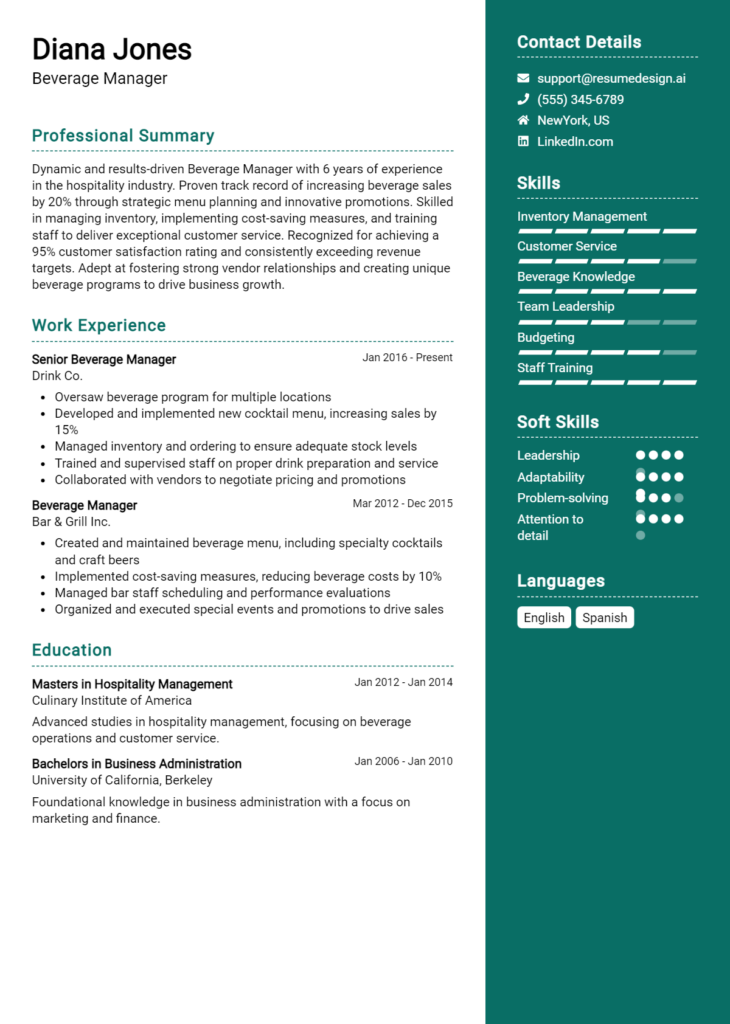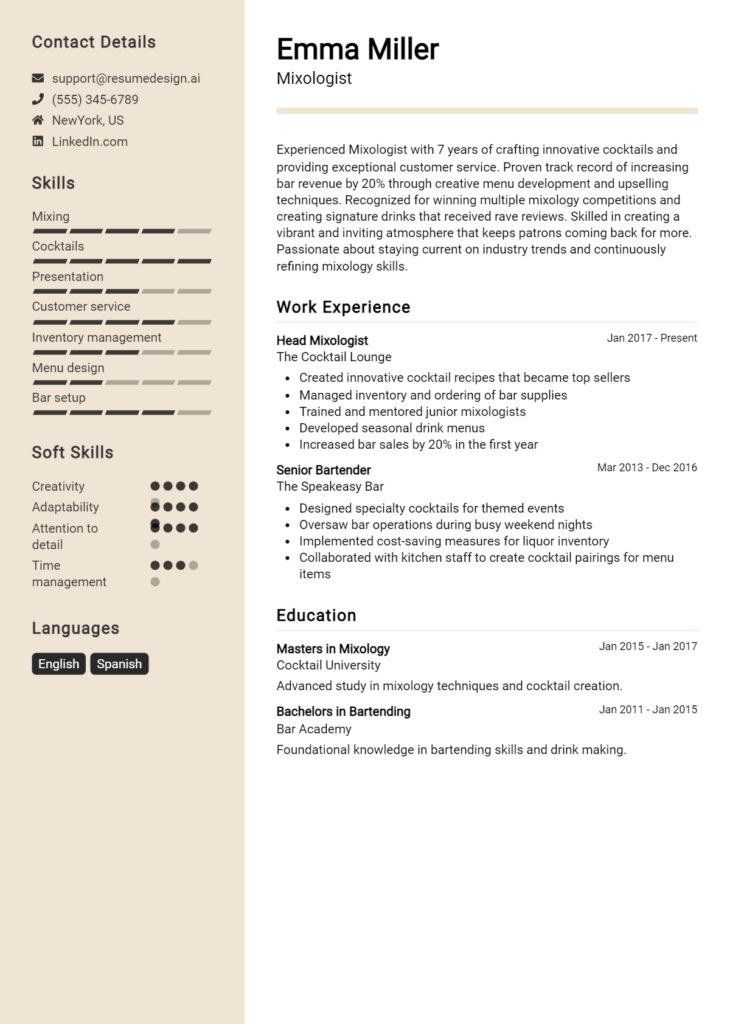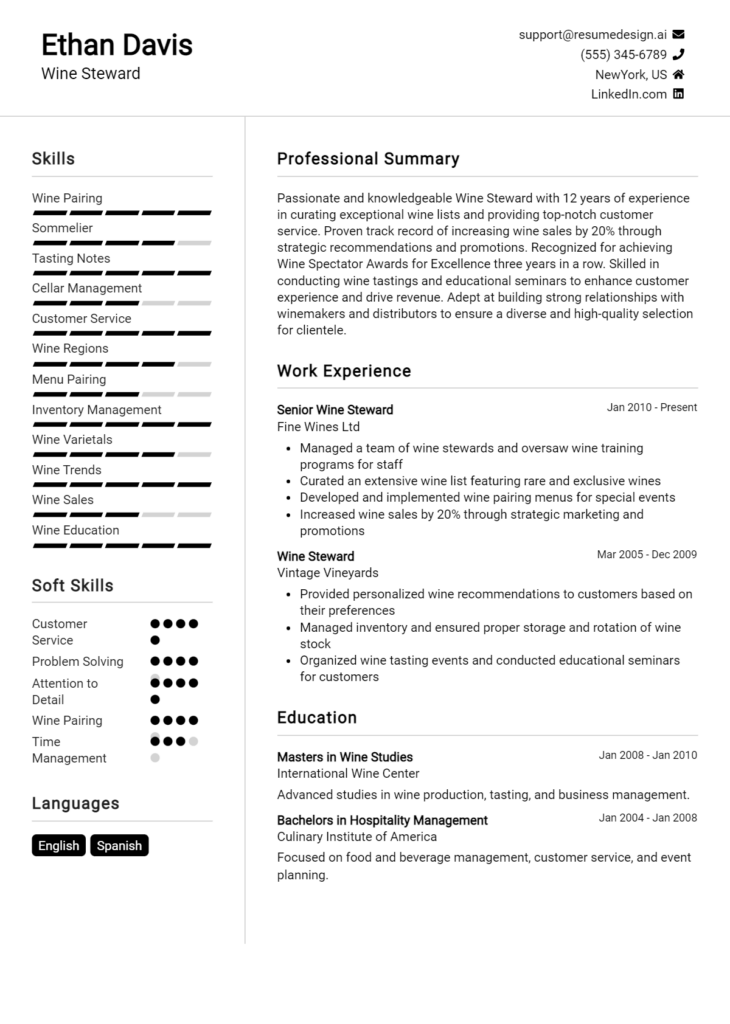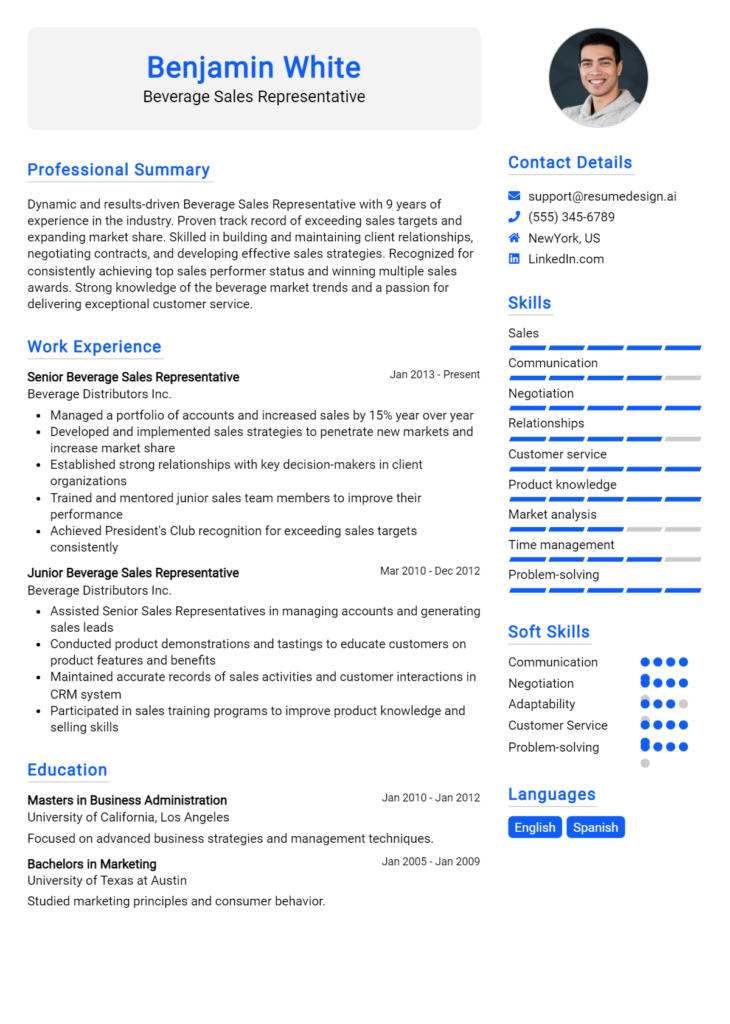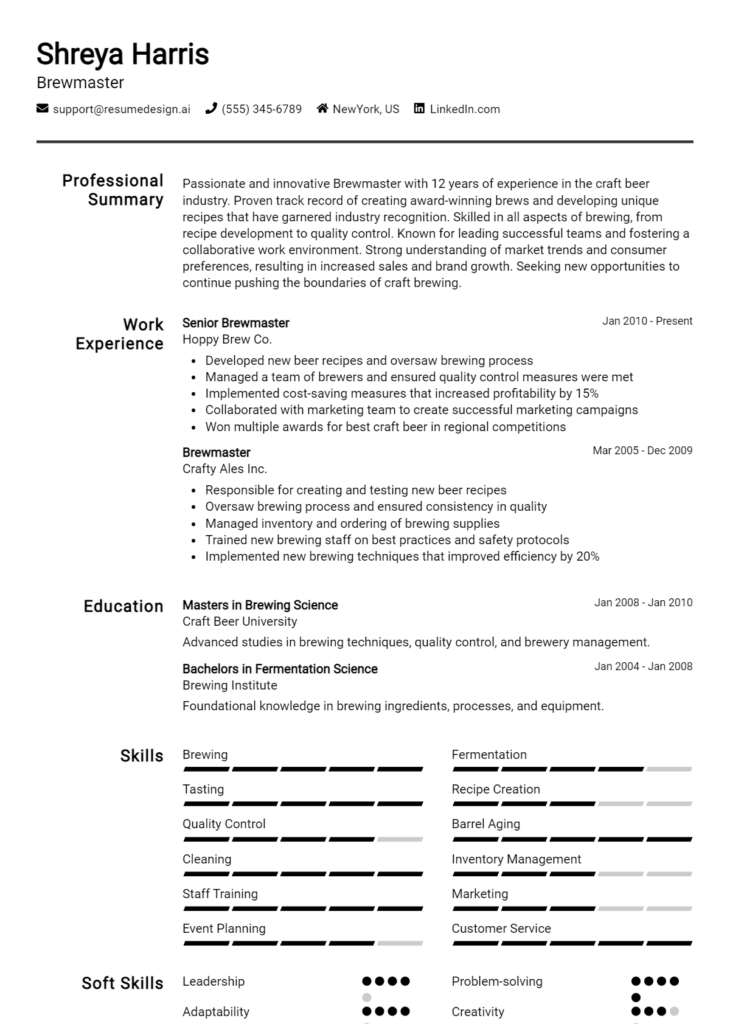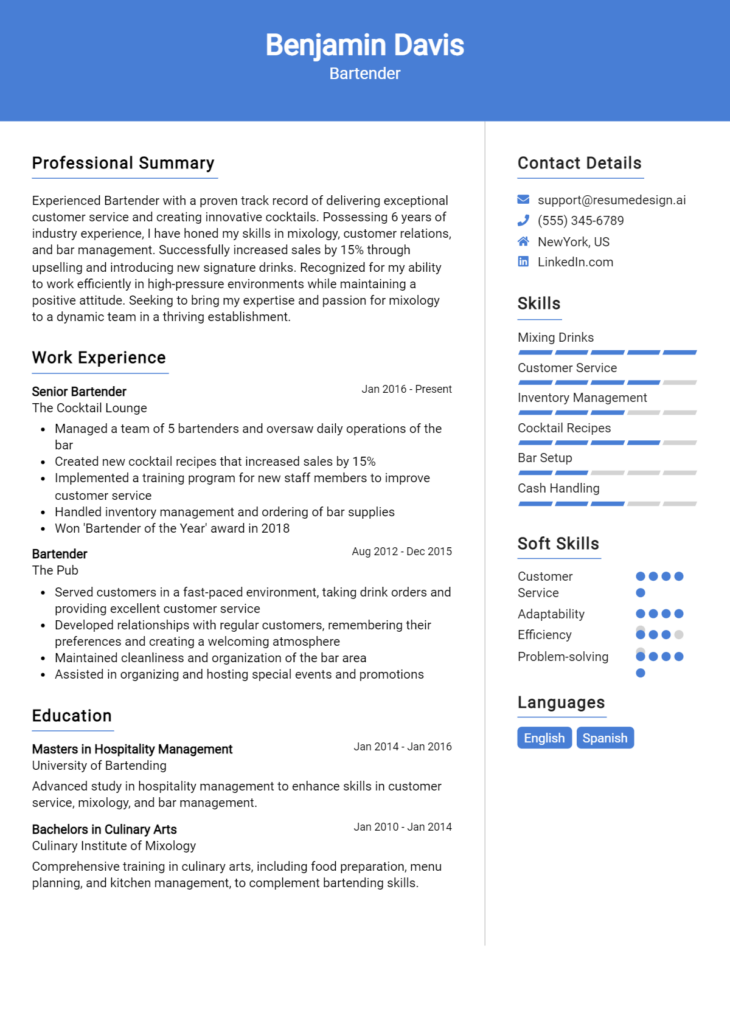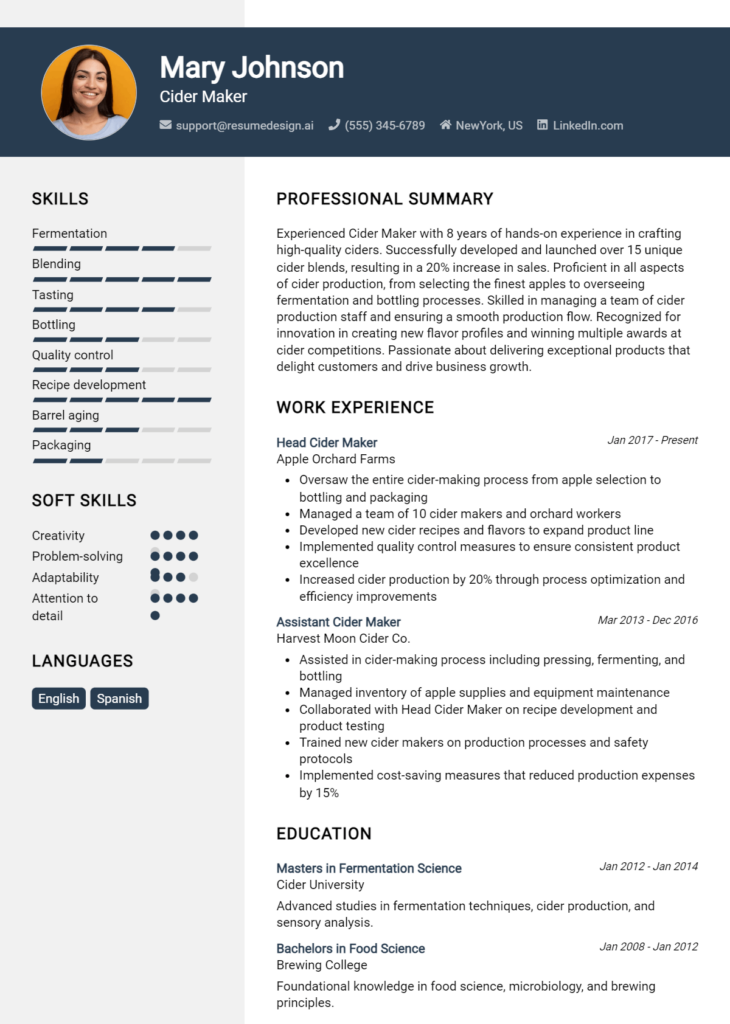Sommelier Core Responsibilities
A Sommelier plays a crucial role in the hospitality industry by expertly selecting and pairing wines with food, ensuring an exceptional dining experience. This position requires strong technical knowledge of wines, operational skills in inventory management, and problem-solving abilities to address customer preferences and inquiries. By bridging the kitchen and service staff, a Sommelier enhances collaboration across departments, ultimately contributing to the organization’s goals of customer satisfaction and profitability. A well-crafted resume effectively highlights these essential skills, showcasing a candidate's qualifications.
Common Responsibilities Listed on Sommelier Resume
- Curate and maintain an extensive wine list tailored to the establishment's cuisine.
- Conduct wine tastings and educational sessions for staff and guests.
- Provide personalized wine pairings to enhance the dining experience.
- Manage wine inventory, including ordering, storage, and tracking usage.
- Stay updated on wine trends, regions, and industry developments.
- Collaborate with chefs to create harmonious food and wine pairings.
- Train and mentor restaurant staff on wine service and knowledge.
- Assist in developing promotional wine events and tastings.
- Handle customer inquiries and complaints regarding wine selections.
- Ensure compliance with health and safety regulations related to wine storage.
- Maintain relationships with wine distributors and producers.
- Monitor and analyze wine sales to inform purchasing decisions.
High-Level Resume Tips for Sommelier Professionals
A well-crafted resume is crucial for Sommelier professionals who aspire to make a lasting impression in the competitive wine and hospitality industry. As the first point of contact between a candidate and a potential employer, a resume must effectively showcase not only a Sommelier's skills and experience but also their achievements and passion for wine. Crafting a compelling resume can significantly impact a candidate's chances of standing out in a crowded job market. This guide will provide practical and actionable resume tips specifically tailored for Sommelier professionals, helping you create a document that reflects your unique qualifications and dedication to the craft of wine service.
Top Resume Tips for Sommelier Professionals
- Tailor your resume to the specific job description, using keywords and phrases mentioned in the posting.
- Highlight relevant experience in the wine and hospitality industry, including previous positions, training, and certifications.
- Quantify your achievements by including metrics, such as sales growth percentages or customer satisfaction ratings.
- Showcase your knowledge of wine regions, varietals, and tasting techniques to demonstrate your expertise.
- Include any industry-specific skills, such as food and wine pairing, inventory management, or wine list development.
- Utilize a clean, professional format that is easy to read and visually appealing.
- Incorporate a summary statement at the top of your resume that highlights your key qualifications and career objectives.
- List any relevant certifications, such as those from the Court of Master Sommeliers or Wine & Spirit Education Trust (WSET).
- Make use of action verbs to describe your responsibilities and accomplishments, conveying a sense of proactivity.
- Keep your resume concise, ideally one page, while providing enough detail to showcase your qualifications.
By implementing these tips, Sommelier professionals can significantly increase their chances of landing a job in the field. A polished and targeted resume not only highlights your skills and achievements but also positions you as a strong candidate who understands the nuances of the industry. Take the time to refine your resume, and you’ll be one step closer to achieving your career aspirations in the world of wine and hospitality.
Why Resume Headlines & Titles are Important for Sommelier
In the competitive world of fine dining and wine service, a Sommelier plays a crucial role in enhancing the overall guest experience through expert wine selections and pairings. As such, crafting an effective resume is essential for standing out in a crowded job market. A strong resume headline or title can instantly grab the attention of hiring managers, summarizing a candidate's key qualifications in a single impactful phrase. It should be concise, relevant, and directly related to the specific Sommelier position being applied for, allowing hiring managers to quickly assess the candidate's fit for the role.
Best Practices for Crafting Resume Headlines for Sommelier
- Keep it concise: Aim for a headline that is short and to the point, ideally under ten words.
- Be role-specific: Tailor the headline to match the specific Sommelier position you are applying for.
- Highlight key qualifications: Focus on your most relevant skills, certifications, or experiences.
- Use impactful language: Choose strong verbs and adjectives that convey your expertise and passion.
- Avoid clichés: Steer clear of overused phrases that do not add value, such as "hardworking" or "team player."
- Incorporate keywords: Use industry-specific terms that align with the job description to enhance visibility.
- Showcase accomplishments: If possible, include quantifiable achievements that demonstrate your success in previous roles.
- Stay professional: Ensure that the tone of the headline is polished and aligns with the expectations of the industry.
Example Resume Headlines for Sommelier
Strong Resume Headlines
Award-Winning Sommelier with 10+ Years of Fine Dining Experience
Certified Wine Specialist Specializing in French and Italian Wines
Expert in Wine Pairing and Beverage Program Management
Dynamic Sommelier with a Proven Track Record in Upselling Wine
Weak Resume Headlines
Just Another Sommelier
Wine Lover Seeking a Job
Experienced Professional
The strong headlines are effective because they immediately convey the candidate's relevant experience, specialization, and achievements in a compelling manner. They use specific language that resonates with hiring managers looking for qualified professionals. In contrast, the weak headlines fail to impress due to their vagueness and lack of specificity; they do not highlight any unique qualifications or contributions, making it difficult for hiring managers to gauge the candidate's fit for the role.
Writing an Exceptional Sommelier Resume Summary
A resume summary is a critical component for any Sommelier seeking to stand out in a competitive job market. This brief yet powerful statement serves as an introduction, quickly capturing the attention of hiring managers by highlighting key skills, relevant experience, and notable accomplishments. In a field where expertise and passion for wine are paramount, a well-crafted summary can differentiate a candidate from the rest, showcasing their unique qualifications and aligning them with the specific needs of the employer. It should be concise, impactful, and tailored to reflect the requirements of the job being applied for.
Best Practices for Writing a Sommelier Resume Summary
- Quantify achievements: Use numbers to demonstrate the impact of your contributions, such as sales increases or customer satisfaction ratings.
- Focus on relevant skills: Highlight skills that directly relate to the sommelier role, such as wine pairing, inventory management, and customer service.
- Tailor the summary: Customize your summary for each job application to ensure it aligns with the specific job description and company culture.
- Showcase certifications: Mention any relevant certifications, such as Court of Master Sommeliers or WSET qualifications, to enhance credibility.
- Use action verbs: Start sentences with strong action verbs to convey confidence and initiative.
- Keep it concise: Aim for 3-5 sentences that effectively summarize your qualifications without overwhelming the reader.
- Emphasize customer engagement: Highlight your ability to connect with customers and enhance their dining experience through expert wine recommendations.
- Reflect your passion: Convey your enthusiasm for wine and the hospitality industry, which can resonate well with potential employers.
Example Sommelier Resume Summaries
Strong Resume Summaries
Dynamic Sommelier with over 5 years of experience in fine dining, recognized for increasing wine sales by 30% through innovative pairing recommendations and exceptional customer service. Holder of WSET Level 3 certification, dedicated to enhancing guest experiences and fostering a passion for wine.
Detail-oriented Sommelier with a proven track record of managing extensive wine lists and successfully curating wine pairings for over 200 events, resulting in a 95% customer satisfaction rate. Adept at training staff on wine knowledge and service techniques.
Accomplished Sommelier with expertise in sourcing unique wines and developing relationships with local vineyards. Increased wine club membership by 40% over 12 months through targeted marketing initiatives and personalized customer engagement.
Weak Resume Summaries
Experienced in the restaurant industry with a focus on wine. I enjoy working with customers and have a lot of knowledge about wine.
Sommelier with a passion for wine and customer service. Looking for opportunities to further my career in a restaurant setting.
The strong resume summaries demonstrate the candidate's achievements, specific skills, and direct relevance to the Sommelier role, providing tangible evidence of their capabilities. In contrast, the weak summaries lack detail and quantifiable outcomes, making them too generic and less compelling to hiring managers. Effective summaries should provide a clear picture of the candidate's value and suitability for the position, setting the stage for a successful application.
Work Experience Section for Sommelier Resume
The work experience section of a Sommelier resume is crucial as it provides a comprehensive overview of the candidate's technical skills, leadership abilities, and capacity to deliver high-quality products in a fast-paced environment. This section not only demonstrates the candidate's expertise in wine selection, pairing, and service but also highlights their experience in managing teams and ensuring customer satisfaction. By quantifying achievements and aligning past experiences with industry standards, candidates can effectively showcase their value to potential employers, making this section a key component of a successful resume.
Best Practices for Sommelier Work Experience
- Detail specific technical skills related to wine selection, service, and storage.
- Use quantifiable metrics to highlight achievements, such as sales increases or customer satisfaction ratings.
- Include relevant certifications and training that bolster your expertise.
- Showcase leadership and teamwork experiences, emphasizing collaboration in high-pressure situations.
- Tailor your experiences to align with the specific requirements of the job you are applying for.
- Utilize action verbs to convey impact and initiative in your roles.
- Provide context for your achievements to illustrate their significance in the hospitality industry.
- Keep descriptions concise and focused, ensuring clarity and readability.
Example Work Experiences for Sommelier
Strong Experiences
- Managed a wine program that increased annual sales by 30%, resulting in a top 10 ranking among local fine dining establishments.
- Led a team of 5 in executing a successful wine pairing event, achieving a 95% customer satisfaction rate based on post-event surveys.
- Trained staff on wine service and knowledge, which improved service speed by 20% and reduced customer complaints by 15%.
- Developed and maintained relationships with over 20 local wineries, enhancing the restaurant's wine offerings and exclusivity.
Weak Experiences
- Worked at a restaurant and helped with wine service.
- Was part of a team that occasionally held wine tastings.
- Assisted in organizing events related to wine.
- Gained some knowledge about different wines while working.
The examples categorized as strong experiences effectively demonstrate specific, quantifiable outcomes and showcase leadership and collaboration skills that are vital in the sommelier role. These experiences highlight concrete achievements, making them impactful and relevant. In contrast, the weak experiences lack detail and specificity, failing to convey the candidate's skills or contributions meaningfully. They appear vague and do not provide potential employers with a clear understanding of the candidate's capabilities or the value they can bring to the organization.
Certifications and Education for a Sommelier Resume
When crafting a resume for a Sommelier position, it is essential to highlight relevant certifications and education that demonstrate your expertise and commitment to the field of wine and beverage service. Here are some guidelines for listing these credentials effectively:
Prioritize Industry-Recognized Certifications: Begin by listing any certifications from reputable organizations that are well-respected in the wine and hospitality industry. Some key certifications to consider include:
Certified Sommelier from the Court of Master Sommeliers
WSET (Wine & Spirit Education Trust) Level 2 or 3 Award in Wines and Spirits
Certified Specialist of Wine (CSW) from the Society of Wine Educators
Advanced Sommelier certification, also from the Court of Master Sommeliers, if applicable
Education Background: Include any formal education that is pertinent to the wine industry. This can range from degrees in hospitality management to specialized wine studies. Here are a few examples of relevant educational backgrounds:
Bachelor’s Degree in Hospitality Management: This degree provides a solid foundation in hospitality principles and practices, which is valuable for a Sommelier role.
Associate’s Degree in Culinary Arts: Many sommeliers have culinary training, as it helps to understand food and wine pairings better.
Specialized Wine Programs: Mention any specific programs or courses taken at institutions like the Culinary Institute of America or local wine schools that focus on wine tasting, production, or service.
Oenology or Viticulture Courses: If you have taken courses related to the science of wine and grape growing, include these as they showcase a deeper understanding of wine production.
Format for Listing: When formatting your certifications and education on your resume, consider using a clear and concise layout. For example:
Certifications:
- Certified Sommelier, Court of Master Sommeliers, Year
- WSET Level 3 Award in Wines and Spirits, Year
- Certified Specialist of Wine (CSW), Society of Wine Educators, Year
Education:
- Bachelor’s Degree in Hospitality Management, University Name, Year
- Associate’s Degree in Culinary Arts, College Name, Year
- Specialized Wine Program, Institution Name, Year
By clearly presenting your certifications and educational background, you will enhance your resume’s credibility and make a strong case for your qualifications as a skilled Sommelier.
Top Skills & Keywords for Sommelier Resume
In the competitive world of fine dining and wine service, a well-crafted resume for a Sommelier must highlight a blend of essential skills that demonstrate both expertise and passion. Employers seek candidates who possess not only technical knowledge about wines but also the interpersonal skills necessary to engage and educate patrons. A Sommelier's ability to recommend wine pairings, manage a wine list, and create an inviting atmosphere relies heavily on a mix of hard and soft skills. By emphasizing these skills in your resume, you can set yourself apart from the competition and showcase your qualifications effectively. For more information on how to enhance your resume, explore the importance of skills and work experience.
Top Hard & Soft Skills for Sommelier
Soft Skills
- Exceptional communication skills
- Strong customer service orientation
- Ability to work under pressure
- Active listening skills
- Attention to detail
- Team collaboration
- Problem-solving capabilities
- Adaptability to various dining environments
- Empathy and emotional intelligence
- Passion for wine and food pairing
Hard Skills
- In-depth knowledge of wine varieties and regions
- Expertise in wine tasting and evaluation
- Ability to create and manage wine lists
- Understanding of wine storage and preservation techniques
- Competence in food and wine pairing principles
- Knowledge of the wine production process
- Proficiency in inventory management
- Certification in wine education (e.g., WSET)
- Familiarity with point-of-sale systems
- Skills in conducting wine tastings and workshops
Stand Out with a Winning Sommelier Cover Letter
Dear [Hiring Manager's Name],
I am writing to express my enthusiasm for the Sommelier position at [Restaurant/Company Name], as advertised. With a deep passion for wine and a commitment to enhancing the dining experience through exceptional wine service, I believe my extensive knowledge of varietals, regions, and pairings, combined with my customer-focused approach, make me an ideal candidate for your esteemed establishment. My background in hospitality, along with my certification from [Relevant Wine Education Institution], has equipped me with the skills to curate a thoughtful wine list that complements your culinary offerings.
Throughout my career, I have honed my ability to engage with guests by providing personalized wine recommendations that elevate their dining experience. At [Previous Employer], I successfully developed and implemented a wine pairing program that increased guest satisfaction ratings by 25%. I am adept at conducting wine tastings, training staff on wine service etiquette, and managing inventory to ensure a diverse and appealing selection for our clientele. My dedication to continuous learning keeps me updated on emerging trends in the wine industry, allowing me to bring fresh perspectives to the role.
I am particularly drawn to [Restaurant/Company Name] because of your commitment to [specific aspect of the restaurant, e.g., sustainability, local sourcing, innovative cuisine]. I am excited about the opportunity to contribute to your team by creating memorable moments for guests through expertly paired wines and engaging storytelling. I am confident that my experience and passion for wine will make a valuable addition to your team.
Thank you for considering my application. I look forward to the opportunity to discuss how my skills and experiences align with the goals of [Restaurant/Company Name]. I am eager to bring my expertise in wine and hospitality to your esteemed establishment and contribute to creating unforgettable dining experiences for your guests.
Sincerely,
[Your Name]
[Your Contact Information]
Common Mistakes to Avoid in a Sommelier Resume
When crafting a resume for a sommelier position, it's crucial to present your qualifications, experiences, and passion for wine in a way that stands out to potential employers. However, many candidates inadvertently include common mistakes that can hinder their chances of landing an interview. Understanding these pitfalls can help you create a polished and professional resume that accurately reflects your skills and expertise in the world of wine.
Neglecting to Tailor the Resume: Failing to customize your resume for each job application can make it seem generic. Highlight specific skills and experiences that relate directly to the position.
Overloading with Technical Terms: While knowledge of wine terminology is essential, using too many technical terms without context can confuse hiring managers who may not share the same depth of expertise.
Ignoring Relevant Experience: Some sommeliers overlook experiences from related fields, such as hospitality or customer service. Highlighting these roles can demonstrate your versatility and understanding of the industry.
Lack of Quantifiable Achievements: Simply stating responsibilities without showcasing accomplishments can weaken your resume. Use specific numbers or outcomes to illustrate your impact, such as increasing wine sales by a certain percentage.
Using Generic Descriptions: Avoid buzzwords and clichés that don't provide real insight into your abilities. Instead, use descriptive language that illustrates your unique skills and personality.
Poor Formatting: A cluttered or overly complicated layout can detract from your message. Ensure that your resume is visually appealing and easy to read, with clear headings and organized sections.
Failing to Include Certifications: If you have any wine-related certifications or formal training, be sure to include them. This information is crucial in establishing your credibility as a sommelier.
Not Showcasing Soft Skills: While technical wine knowledge is vital, don't forget to highlight soft skills such as communication, teamwork, and customer service, which are equally important in a sommelier role.
Conclusion
As we've explored, the role of a Sommelier is multifaceted, requiring a deep understanding of wine, excellent communication skills, and a passion for enhancing the dining experience. Key responsibilities include curating wine lists, advising patrons on wine pairings, and staying current with industry trends. A successful Sommelier not only possesses extensive knowledge of wines but also demonstrates exceptional customer service and sales skills.
To position yourself effectively in this competitive field, it is crucial to have a well-crafted resume that highlights your qualifications and experiences. Take the time to review and refine your Sommelier resume, ensuring it reflects your unique skills and accomplishments.
To assist you in this process, consider utilizing some helpful tools. You can find a variety of resume templates that can serve as a great starting point for showcasing your expertise. Additionally, a resume builder can guide you through the creation of a professional and polished document tailored to your needs. Don’t forget to complement your resume with a compelling cover letter using our cover letter templates.
Now is the time to take action—refine your resume and make a lasting impression in your Sommelier career!

